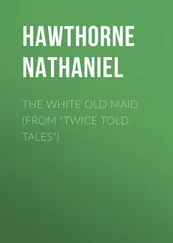Arcadians though we were, our costume bore no resemblance to the beribboned doublets, silk breeches and stockings, and slippers fastened with artificial roses, that distinguish the pastoral people of poetry and the stage. In outward show, I humbly conceive, we looked rather like a gang of beggars, or banditti, than either a company of honest laboring-men, or a conclave of philosophers. Whatever might be our points of difference, we all of us seemed to have come to Blithedale with the one thrifty and laudable idea of wearing out our old clothes. Such garments as had an airing, whenever we strode afield! Coats with high collars and with no collars, broad-skirted or swallow-tailed, and with the waist at every point between the hip and arm-pit; pantaloons of a dozen successive epochs, and greatly defaced at the knees by the humiliations of the wearer before his lady-love, — in short, we were a living epitome of defunct fashions, and the very raggedest presentment of men who had seen better days. It was gentility in tatters. Often retaining a scholarlike or clerical air, you might have taken us for the denizens of Grub Street, intent on getting a comfortable livelihood by agricultural labor; or Coleridge’s projected Pantisocracy in full experiment; or Candide and his motley associates at work in their cabbage garden; or anything else that was miserably out at elbows, and most clumsily patched in the rear. We might have been sworn comrades to Falstaff’s ragged regiment. Little skill as we boasted in other points of husbandry, every mother’s son of us would have served admirably to stick up for a scarecrow. And the worst of the matter was, that the first energetic movement essential to one downright stroke of real labor was sure to put a finish to these poor habiliments. So we gradually flung them all aside, and took to honest homespun and linsey-woolsey, as preferable, on the whole, to the plan recommended, I think, by Virgil, — ”Ara nudus; sere nudus, “ — which as Silas Foster remarked, when I translated the maxim, would be apt to astonish the women-folks.
After a reasonable training, the yeoman life throve well with us. Our faces took the sunburn kindly; our chests gained in compass, and our shoulders in breadth and squareness; our great brown fists looked as if they had never been capable of kid gloves. The plough, the hoe, the scythe, and the hay-fork grew familiar to our grasp. The oxen responded to our voices. We could do almost as fair a day’s work as Silas Foster himself, sleep dreamlessly after it, and awake at daybreak with only a little stiffness of the joints, which was usually quite gone by breakfast-time.
To be sure, our next neighbors pretended to be incredulous as to our real proficiency in the business which we had taken in hand. They told slanderous fables about our inability to yoke our own oxen, or to drive them afield when yoked, or to release the poor brutes from their conjugal bond at nightfall. They had the face to say, too, that the cows laughed at our awkwardness at milking-time, and invariably kicked over the pails; partly in consequence of our putting the stool on the wrong side, and partly because, taking offence at the whisking of their tails, we were in the habit of holding these natural fly-flappers with one hand and milking with the other. They further averred that we hoed up whole acres of Indian corn and other crops, and drew the earth carefully about the weeds; and that we raised five hundred tufts of burdock, mistaking them for cabbages; and that by dint of unskilful planting few of our seeds ever came up at all, or, if they did come up, it was stern-foremost; and that we spent the better part of the month of June in reversing a field of beans, which had thrust themselves out of the ground in this unseemly way. They quoted it as nothing more than an ordinary occurrence for one or other of us to crop off two or three fingers, of a morning, by our clumsy use of the hay-cutter. Finally, and as an ultimate catastrophe, these mendacious rogues circulated a report that we communitarians were exterminated, to the last man, by severing ourselves asunder with the sweep of our own scythes! and that the world had lost nothing by this little accident.
But this was pure envy and malice on the part of the neighboring farmers. The peril of our new way of life was not lest we should fail in becoming practical agriculturists, but that we should probably cease to be anything else. While our enterprise lay all in theory, we had pleased ourselves with delectable visions of the spiritualization of labor. It was to be our form of prayer and ceremonial of worship. Each stroke of the hoe was to uncover some aromatic root of wisdom, heretofore hidden from the sun. Pausing in the field, to let the wind exhale the moisture from our foreheads, we were to look upward, and catch glimpses into the far-off soul of truth. In this point of view, matters did not turn out quite so well as we anticipated. It is very true that, sometimes, gazing casually around me, out of the midst of my toil, I used to discern a richer picturesqueness in the visible scene of earth and sky. There was, at such moments, a novelty, an unwonted aspect, on the face of Nature, as if she had been taken by surprise and seen at unawares, with no opportunity to put off her real look, and assume the mask with which she mysteriously hides herself from mortals. But this was all. The clods of earth, which we so constantly belabored and turned over and over, were never etherealized into thought. Our thoughts, on the contrary, were fast becoming cloddish. Our labor symbolized nothing, and left us mentally sluggish in the dusk of the evening. Intellectual activity is incompatible with any large amount of bodily exercise. The yeoman and the scholar — the yeoman and the man of finest moral culture, though not the man of sturdiest sense and integrity — are two distinct individuals, and can never be melted or welded into one substance.
Zenobia soon saw this truth, and gibed me about it, one evening, as Hollingsworth and I lay on the grass, after a hard day’s work.
“I am afraid you did not make a song today, while loading the hay-cart,” said she, “as Burns did, when he was reaping barley.”
“Burns never made a song in haying-time,” I answered very positively. “He was no poet while a farmer, and no farmer while a poet.”
“And on the whole, which of the two characters do you like best?” asked Zenobia. “For I have an idea that you cannot combine them any better than Burns did. Ah, I see, in my mind’s eye, what sort of an individual you are to be, two or three years hence. Grim Silas Foster is your prototype, with his palm of sole-leather, and his joints of rusty iron (which all through summer keep the stiffness of what he calls his winter’s rheumatize), and his brain of — I don’t know what his brain is made of, unless it be a Savoy cabbage; but yours may be cauliflower, as a rather more delicate variety. Your physical man will be transmuted into salt beef and fried pork, at the rate, I should imagine, of a pound and a half a day; that being about the average which we find necessary in the kitchen. You will make your toilet for the day (still like this delightful Silas Foster) by rinsing your fingers and the front part of your face in a little tin pan of water at the doorstep, and teasing your hair with a wooden pocket-comb before a seven-by-nine-inch looking-glass. Your only pastime will be to smoke some very vile tobacco in the black stump of a pipe.”
“Pray, spare me!” cried I. “But the pipe is not Silas’s only mode of solacing himself with the weed.”
“Your literature,” continued Zenobia, apparently delighted with her description, “will be the ‘Farmer’s Almanac;’ for I observe our friend Foster never gets so far as the newspaper. When you happen to sit down, at odd moments, you will fall asleep, and make nasal proclamation of the fact, as he does; and invariably you must be jogged out of a nap, after supper, by the future Mrs. Coverdale, and persuaded to go regularly to bed. And on Sundays, when you put on a blue coat with brass buttons, you will think of nothing else to do but to go and lounge over the stone walls and rail fences, and stare at the corn growing. And you will look with a knowing eye at oxen, and will have a tendency to clamber over into pigsties, and feel of the hogs, and give a guess how much they will weigh after you shall have stuck and dressed them. Already I have noticed you begin to speak through your nose, and with a drawl. Pray, if you really did make any poetry to-day, let us hear it in that kind of utterance!”
Читать дальше












